Research released this year highlighted the ongoing challenges faced by the waste industry in dealing with, and facing the cost of, fires. The study revealed that lithium-ion batteries are responsible for almost half of the UK’s waste fires with an estimated cost of around £158 million to the UK economy. It’s yet another issue that the industry has to factor in, in a sector where fires have already caused major levels of disruption.
This year alone has seen a spate of fires in waste processing facilities and landfill sites. In Bury in Greater Manchester, a massive fire broke out at a landfill site in April. It was an extremely challenging fire to bring under control, resulting in the declaration of a major incident as fire crews worked to extinguish the blaze that was estimated to be around the size of a football pitch.
The landfill site contained mostly household waste therefore did not present a ‘significant risk’ to the health of nearby residents, although they were advised to keep their windows closed. A couple of months later another Greater Manchester fire, this time in Oldham, broke out at a waste processing plant and residents were advised to exercise extreme caution, close windows and doors and stay away from the immediate area due to the nature of the material that was burning. A couple of weeks before the Oldham fire there had been a massive electrical waste fire in Walsall, Birmingham. And in September this year a major fire in Kirkdale, Liverpool required a firefighting presence over a two day period to fully extinguish the blaze.
The FPA had already been urging action
Even before any of those fires, the Fire Protection Association was already highlighting the worrying number of waste fires happening as part of efforts to encourage site owners to take another look at fire safety guidance and check they were doing everything possible to reduce risks. Waste fires have the potential to do a great deal of damage to communities, to the environment and to the business itself. And clearly, as is the case with any fire, they can cause serious harm to anyone in the immediate area. If it transpires that a company hasn’t put the correct steps in place to manage fire safety risks, it could lead to significant fines and even prosecutions, and also affect the ability to make insurance claims too.
The nature of the industry means reducing fire risk is highly complex. Lithium-ion batteries have become a real problem due to their extensive use in all kinds of applications; while most people will be aware that they’re used in mobile phones, they can be found in items as obscure as singing greetings cards. It’s not too difficult for them to end up being thrown away into the wrong waste stream, be damaged and cause a fire as a result.
And the risks presented by other waste materials pose many difficult and unique challenges from a fire safety perspective as well. Waste generates its own heat with various chemical and biological processes, potentially leading to self-combustion. Decomposing material can release methane. Hot works, flammable vapours and electrical faults add to potential hazards. And there can be arson risks too.
Controlling the risks
Waste processing companies and landfill sites must carry out regular fire risk assessments, ensuring that appropriate measures remain in place to reduce the identified risks. There are many angles to consider: from whole site considerations like community and environmental impacts through to the more specific details around waste storage and processing. Some key points include:
- Identification of all of the potential ignition sources.
- Material storage arrangements: avoid stacking it too high or too close together as this can enable fire to spread rapidly.
- The suitability of fire detection and suppression systems and firefighting equipment around the premises. It must be fit for purpose and maintained according to its service schedule.
- Shut down procedures: is there more that can be done to reduce the risk of fire outside of site working hours?
- Staff training: this should cover operating procedures from a fire safety viewpoint but should also ensure employees and contractors know how to respond appropriately in the event of fire, including raising the alarm and site evacuation processes.
With these and many other considerations to take into account, this guidance from WISH (the Waste Industry Safety and Health Forum) is a useful source of detailed information about the steps that can be taken. And due to the complexity of these types of facilities, it’s advisable to seek professional guidance from a fire risk assessor to address the specific risks at your site. If you would like to talk to us about how we can support you through the fire risk assessment process and advise you on the necessary actions to take, then please do get in touch.
